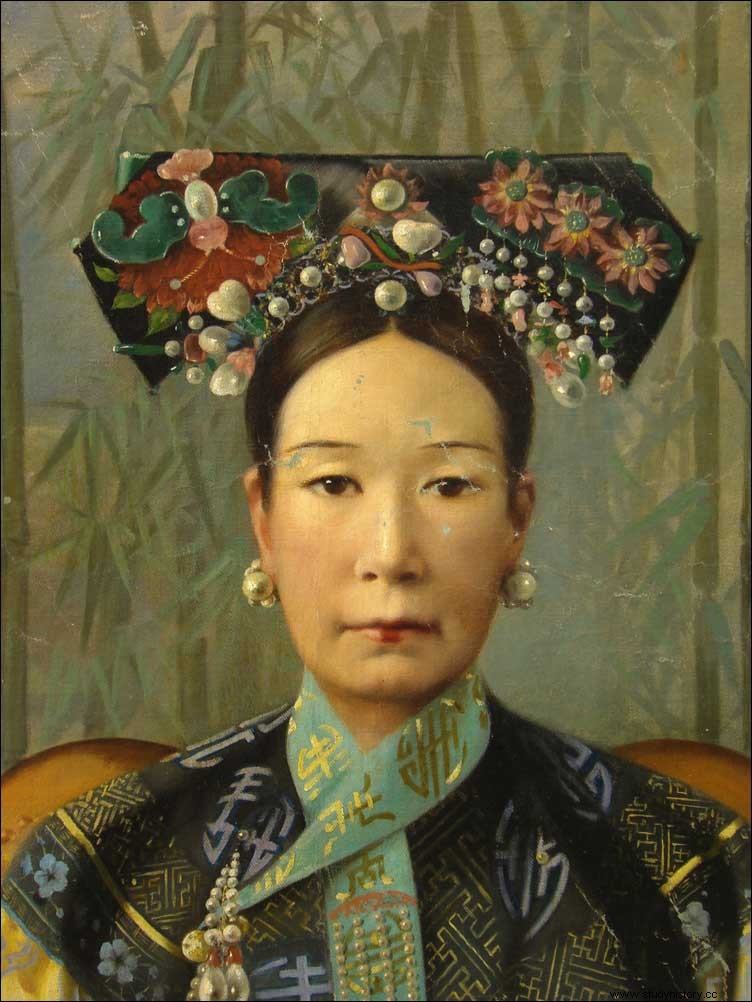Chinese Dowager Empress , Cixi , or Tseu-Hi (1835-1908), first played the role of adviser to the emperor before exercising real power between 1861 and 1908.
The Emperor's favorite concubine
 Daughter of Huizheng, imperial ensign-bearer, Cixi was born in Beijing during the winter of 1835. Orphaned during her youth , she is educated by her uncle. In 1851, at the age of 15, she was chosen, along with about sixty other young girls, to become the concubine of Emperor Xianfeng.
Daughter of Huizheng, imperial ensign-bearer, Cixi was born in Beijing during the winter of 1835. Orphaned during her youth , she is educated by her uncle. In 1851, at the age of 15, she was chosen, along with about sixty other young girls, to become the concubine of Emperor Xianfeng.
In 1852, Ci'an, concubine of Xianfeng, officially became empress, but she failed to have a son. In 1854, Xiafeng chose Cixi as a favorite; on April 27, 1856, she gave birth to a son, Zaichun, and became the most important woman in China after the empress. The education of the prince is entrusted to Ci'an and the court eunuchs and Cixi becomes adviser to the emperor in the affairs of the Empire. Unlike most concubines, she can read and write and can assist Xianfeng in government duties. In his contact, she learns the management of state affairs.
In 1860, during the Second Opium War, the French and English attacked Beijing and the court fled to Rehe in Manchuria. Xianfeng sank into depression, alcohol, and drugs, and died on August 22, 1861. Six-year-old Zaichun was enthroned as Emperor Tongzhi, and Ci'an and Cixi jointly became Empresses Dowager.
The Dowager Empress who “reigns behind the curtains”
With a gentle character, Ci'an remains in the shadows and Cixi alone holds full powers. Even when her son comes of age, she continues to pull the strings; Apparently, Tongzhi makes the decisions and promulgates the decrees, but it is Cixi who "reigns behind the curtains".
An incompetent emperor, Tongzhi died ill in 1874, possibly of syphilis. His wife is then pregnant and Cixi fears that she will give birth to a son, which would strip her of her power. On the very day of her son's death, she summons the high dignitaries of the Empire to have Zaitian, her sister's three-year-old son, named heir. The child becomes emperor under the name of Guangxu and Cixi continues to reign. Like Tongzhi, growing up, he remains under the influence of the powerful Empress.
In 1898, faced with the weakening of Imperial China, Guangxu launched the Hundred Days Reform, a reform movement in all areas. To counter her nephew's attempted emancipation, Cixi organizes a coup. She decrees the emperor incapable of governing, has him locked up in his palace and forges alliances. In 1900, the Eight-Nation Alliance (Austro-Hungarian Empire, France, German Empire, Kingdom of Italy, Empire of Japan, Empire of Russia, United Kingdom and United States) defeated its allies and Cixi fled to Xi' year.
Emperor Guangxu died of arsenic poisoning on November 14, 1908, possibly on the orders of Cixi. The day before, Cixi appoints Puyi, son of Prince Chun, to be the new emperor. She herself died the next day, November 15, 1908, probably poisoned.
